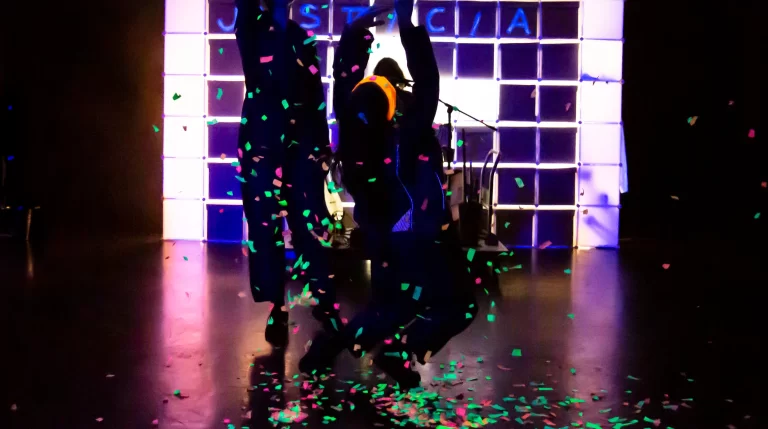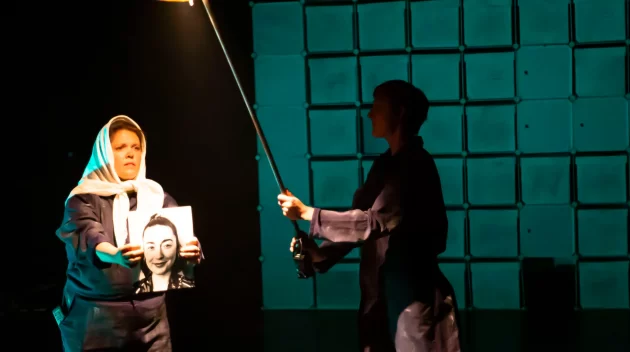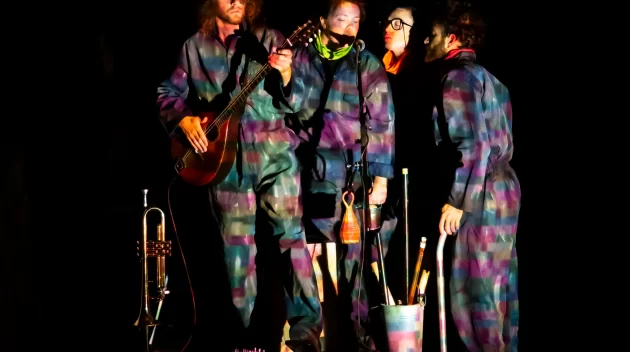
Rewind at Edinburgh Fringe: ‘In Digging Up the Past, We Will Build the Future’.
23 August, 2023Rewind, a multi-disciplinary play inspired by the work of the Argentine Forensic Anthropology Team, combines music, physical theatre, puppetry and lighting to tell the story of Alicia, an embodiment of those who endured and continue to endure harsh authoritarian regimes in Latin America.
Winner of Summerhall’s inaugural Rewind award at the 2023 Edinburgh Fringe (an award named after the show), the spectacle is directed by Brazilian Ramon Ayres and performed by Colombian theatremaker Andres Velasquez, Icelandic Eyglo Belafonte and UK-based Alex Paton, Louise Willcox and Josephine Tremelling.
I asked Ramon how the show came into being and he explained that the project started in late 2019, around the time of the Chilean estadillo social protests and the proliferation of other repressive right- wing political campaigns across Latin America. He says the riots and acts of resistance inspired them, and “gave them some fire to start a campaign of their own”.
The plot is based on the work of the Argentine Forensic Anthropolgy Team, whose decades of dedication to finding and identifying the remains of Argentinians who had disappeared during the ‘Dirty War’ (1976-1983) earned them a Nobel Peace Prize nomination in 2020. As the forensic team examine and measure Alicia’s bones, the phantom of the play, we see a scientific examination of a past that was literally buried. The skull held by each actor throughout could represent millions of victims of political regimes in Latin America.
In fact, When I interviewed Ramon in Edinburgh, he told me that universality was a quality they strived for.

“The show unfortunately has a lot of longevity; in that it speaks to people from all over the world and will continue to. One Ukrainian in the audience said, ‘You’re telling my story’ and a South Korean spectator said it reminded them of the South Korean Gwangju Uprising in the 1980s”.
Whilst the play could represent any nation which has experienced regimes of terror, it was while touring the show in Colombia and Chile in 2022 where it had its profoundest impact:
“It was incredible. It was life-changing. In Colombia, these things are still happening. The mother of someone who was ‘disappeared’ was sitting in the second row. We had chats after every show, people would talk about their own personal lives, and it was so touching and special.”
They even performed the show in Trujillo, a Colombian town which experienced a series of brutal murders in the 1990s. Ramon told me that in the audience there were friends of victims of the massacre, but also former police officers and informants who were complicit.
Eyglo Belafonte, one of the three protagonists, told me about the pressure she felt performing in Colombia. She felt originally that, being Icelandic, it may seem hypocritical to perform such an emotionally charged piece in the places whose histories inspired the play:
“We thought people would think why are you coming over to tell me this, my story? People were grateful though, that we were an outside group, they felt like they were being heard and also most of the time they are not allowed to talk about politics. You never know who’s listening. We have a privilege to be able to go and do it. We try our hardest to step into the story, then step out of it.”

The tone of the play is incredibly sensitive, and Andres Velasquez, Eyglo Belafonte and Louise Wilcox’s performances are full of feeling. Alex Paton on a loop pedal weaves visceral beats into the soundtrack of the piece. From playing a traditional banjo to making echoey screeches, he captures the contradictory nature of life in so many Latin American countries during political uncertainty; rich music and protest songs are heard alongside the screams of protestors being beaten in the street. Paton’s sonic improvisation and the free flow of Josephine Tremelling’s lighting perfectly compliment the piece from start to finish. Furthermore, the filing cabinets at the back of the stage which could be from any secret police headquarters or hospital are an unsettling touch.
Perhaps the crescendo of the play is when the three actors hold up Alicia’s skeleton and walk it around the stage: The stage is bathed in an earthy red and in the bones propped up by Andres, Eyglo and Louise one sees the overarching message of the importance of forensic science in the play:
On the work of the Argentine Forensic Anthropologists Ramon said, “They listen to the bones. It’s an act of resistance to bring them back to life”.
Whilst this task of bringing the dead back to life is a daunting one, it is a responsibility which Ramon takes on with a real sense of purpose:
“When you make plays, you’re helping people form their opinions, doing the piece in South America, we were offering people reconciliation to pain. It’s a huge responsibility, but with more art, we have fewer sick people”.
The piece is being performed at Summerhall Old Lab in Edinburgh until 27 August and has a UK tour planned until October. More information about buying tickets can be found at https://tickets.edfringe.com/whats-on/rewind
Follow Sounds and Colours: Facebook / Twitter / Instagram / Mixcloud / Soundcloud / Bandcamp
Subscribe to the Sounds and Colours Newsletter for regular updates, news and competitions bringing the best of Latin American culture direct to your Inbox.

